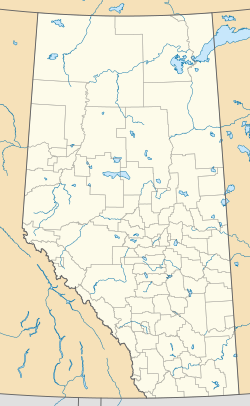Black Diamond, Alberta
Black Diamond | |
|---|---|
Former town | |
 Downtown Black Diamond on Alberta Highway 22 | |
| Coordinates: 50°41′17″N 114°14′00″W / 50.68806°N 114.23333°W | |
| Country | Canada |
| Province | Alberta |
| Region | Calgary Metropolitan Region |
| Census division | 6 |
| Town | Diamond Valley |
| Incorporated[1] | |
| • Village | May 8, 1929 |
| • Town | January 1, 1956 |
| Amalgamated[2] | January 1, 2023 |
| Government | |
| • Governing body | Diamond Valley Town Council |
| Area (2021)[3] | |
| • Land | 6.82 km2 (2.63 sq mi) |
| Elevation | 1,159 m (3,802 ft) |
| Population | |
| • Total | 2,730 |
| • Density | 400.4/km2 (1,037/sq mi) |
| Time zone | UTC−07:00 (MST) |
| • Summer (DST) | UTC−06:00 (MDT) |
| Postal code span | |
| Area codes | 403, 587, 825, 368 |
| Highways | Highway 22 Highway 7 |
| Waterways | Sheep River |
| Website | town.blackdiamond.ab.ca (archived December 29, 2022) |
Black Diamond was a town in the Calgary Metropolitan Region of Alberta, Canada within the Town of Diamond Valley. It is at the intersection of Highway 22 (Cowboy Trail) and Highway 7. Its first post office opened in 1907.[6] Black Diamond was so named because of coal deposits near the original town site.[7] Little oil or gas remains.
It was a sister town to Turner Valley, and has a hospital, shops, hotels and residences, elementary school (K-6th grade), high school (7th-12th grade), hockey rink and a Boys and Girls Club.
Black Diamond is located in the foothills of the Canadian Rockies in the midst of some of Canada's best ranch country.
A 3 km (1.9 mi) trail next to the roadway between Black Diamond and Turner Valley is named the Friendship Trail.
History
[edit]Black Diamond incorporated as a village on May 8, 1929.[1] After nearly 26 years as a village, Black Diamond incorporated as a town on January 1, 1956.[1]
On May 25, 2022, the Province of Alberta issued an Order in Council to amalgamate Black Diamond and Turner Valley to form the new Town of Diamond Valley, with an incorporation date of January 1, 2023. [8]
This followed decades of talk and a 2007 plebiscite that saw Turner Valley citizens embrace amalgamation and Black Diamond residents reject it. [9]
Ultimately, the prospect of efficiencies, and possible cost savings of $1 million a year became a major catalyst to approving the merger without a plebiscite. [9]
On January 1, 2023, the Town of Black Diamond amalgamated with its neighbouring Town of Turner Valley to form the Town of Diamond Valley.[2]
Demographics
[edit]In the 2021 Census of Population conducted by Statistics Canada, the Town of Black Diamond had a population of 2,730 living in 1,178 of its 1,233 total private dwellings, a change of 0.9% from its 2016 population of 2,705. With a land area of 6.82 km2 (2.63 sq mi), it had a population density of 400.3/km2 (1,036.8/sq mi) in 2021.[3]
In the 2016 Census of Population conducted by Statistics Canada, the Town of Black Diamond recorded a population of 2,700 living in 1,098 of its 1,108 total private dwellings, a 13.8% change from its 2011 population of 2,373. With a land area of 3.84 km2 (1.48 sq mi), it had a population density of 703.1/km2 (1,821.1/sq mi) in 2016.[10]
Government
[edit]Black Diamond was governed by a town council of seven including a mayor and six councillors. The final mayor of the Town of Black Diamond was Brendan Kelly.[1]
Since January 1, 2023, the area of Black Diamond is governed by the Diamond Valley Town Council.
Gallery
[edit]-
Looking south in Black Diamond
-
Sign looking east on Alberta Highway 22
-
Post office
-
Looking east at Black Diamond
-
Oilfields General Hospital
See also
[edit]- Black Diamond (Oilfields General Hospital) Heliport
- Black Diamond/Cu Nim Airport
- Black Diamond/Flying R Ranch Aerodrome
- List of communities in Alberta
- List of former urban municipalities in Alberta
References
[edit]- ^ a b c d "Municipal Profiles: Towns" (PDF). Alberta Municipal Affairs. August 13, 2021. pp. 50–52. Retrieved August 14, 2021.
- ^ a b "O.C. 156/2022". Government of Alberta. May 25, 2022. Retrieved May 25, 2022.
- ^ a b c "Population and dwelling counts: Canada, provinces and territories, and census subdivisions (municipalities)". Statistics Canada. February 9, 2022. Retrieved February 9, 2022.
- ^ "Alberta Private Sewage Systems 2009 Standard of Practice Handbook: Appendix A.3 Alberta Design Data (A.3.A. Alberta Climate Design Data by Town)" (PDF) (PDF). Safety Codes Council. January 2012. pp. 212–215 (PDF pages 226–229). Archived from the original (PDF) on October 16, 2013. Retrieved October 8, 2013.
- ^ "Population and dwelling counts: Canada and population centres". Statistics Canada. February 9, 2022. Retrieved February 13, 2022.
- ^ Hamilton, William (1978). The Macmillan Book of Canadian Place Names. Toronto: Macmillan. p. 21. ISBN 0-7715-9754-1.
- ^ Place-names of Alberta. Ottawa: Geographic Board of Canada. 1928. p. 20.
- ^ "Amalgamation | Diamond Valley, AB". www.diamondvalley.town. Retrieved 2023-07-18.
- ^ a b Kaufmann, Bill (May 27, 2022). "Diamond Valley: Two towns will become one in Alberta". Calgary Herald. Retrieved July 18, 2023.
- ^ "Population and dwelling counts, for Canada, provinces and territories, and census subdivisions (municipalities), 2016 and 2011 censuses – 100% data (Alberta)". Statistics Canada. February 8, 2017. Retrieved February 8, 2017.







